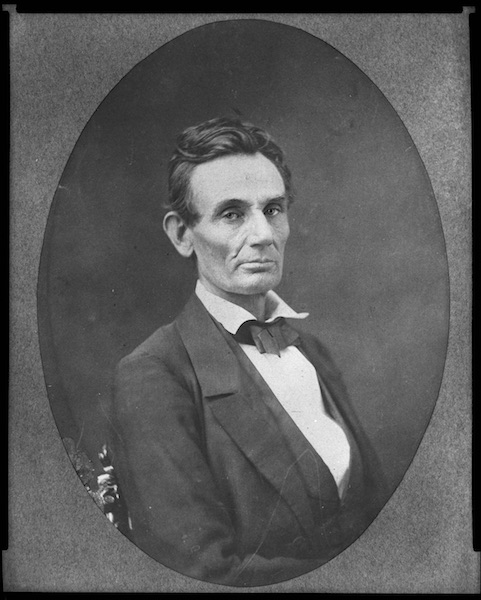
Abraham Lincoln as he would have looked during his two Iowa visits to Dubuque in July and Council Bluffs in August of 1859. This image was taken by S.M. Fasset in October 1859 in Chicago. It was said of the image, “Mrs. Lincoln pronounced it the best likeness she had ever seen of her husband.” Photo courtesy of the Library of Congress
By John T. Pregler
Legend around Dubuque long held that Abraham Lincoln had visited Iowa’s oldest city in the 1850s. Until 2018, no one could say when Lincoln was in Dubuque, or what the occasion was that brought him to the western banks of the Mississippi River. Some speculated that Lincoln was in Dubuque in late 1858 or 1859 for a weekend respite while trying a legal case in Jo Daviess County Circuit Court in Galena, Ill. But no one knew for certain. And so, the legend went.
Iowa historians had long documented three known instances of Lincoln visiting Iowa, along with his other connections to the Hawkeye state. Lincoln is believed to have first stepped on Iowa soil in Davenport in 1857. Lincoln was the attorney for the Rock Island Bridge Co. in a famous legal case between the company and the owner of the steamboat “Effie Afton,” which drifted into the bridge, damaging both the boat and the bridge. Lincoln made a trip to Rock Island, Ill., to personally inspect the damaged bridge and crossed over the river channel to view the bridge from the Iowa side, marking the first time Lincoln stepped on Iowa soil.
The Illinois rail splitter next visited Iowa on Oct. 9, 1858, giving a rousing political speech at Grimes Hall in Burlington. The third and last known visit to Iowa by Lincoln was in August of 1859, when Lincoln and his wife, Mary Todd Lincoln, along with their travel party, made a special trip from Kansas City to Council Bluffs, so Lincoln could see a piece of land put up as collateral in a loan he was associated with. Lincoln also took the time to meet with Council Bluffs resident and nationally respected railroad engineer, Grenville Dodge, to get his thoughts on a route and connecting point for a transcontinental railroad.
In January 2018, I found evidence that Lincoln had indeed visited the “Key City to the Northwest.” The story of Lincoln’s fourth known visit into the Hawkeye state is a tale of a corporate railroad lawyer, along with an accomplished railroad engineer and the events of the 1850s that led to Lincoln’s last significant legal case before going on to be elected President of the United States.
TO READ THE ENTIRE STORY AND OTHER FASCINATING STORIES ABOUT IOWA HISTORY, subscribe to Iowa History Journal.
